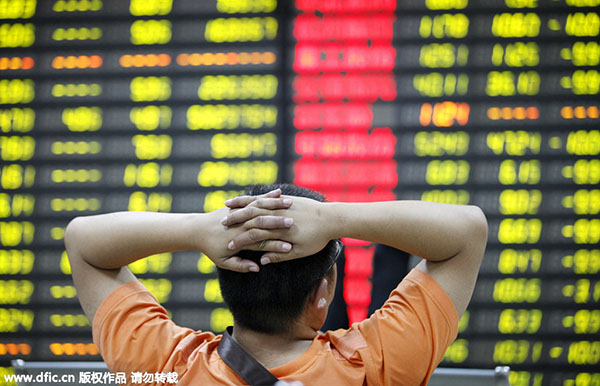|
 |
|
An investor checks stock index at a brokerage house in Huaibei, Anhui province, July 7, 2015. [Photo / IC] |
Market regulatory officials are pushing for provisions to be included in a Securities Law amendment to create a national financial stabilization fund that would legitimize and enable government intervention during turmoil in the securities market.
The effort comes against the background of the recent massive sell-off of shares that slashed the benchmark stock index by 30 percent from the mid-June peak. The sell-off ended only after the central government intervened.
On Sunday, the China Securities Regulatory Commission instructed brokerages to be more effective in enforcing the rules that require the use of real names and national ID numbers.
The CSRC pledged to clamp down on a trick whereby an investor controls multiple accounts registered under false names and ID numbers to bid the price of a stock up or down.
Lawmakers of the National People's Congress Standing Committee are likely to draft provisions on creating a financial stabilization fund in the amendment and give government intervention a solid and well-defined legal basis, said Wang Changhe, a CSRC official, on the sidelines of a legal seminar in Beijing over the weekend.
A financial stabilization fund, known also as a buffer fund, serves as an emergency government fund to address a financial market crisis or stabilize stock prices when the market experiences an unreasonable and irrational surge or slump.
The provisions should also include "safe-harbor" rules, which will protect the government's intervention from liabilities of market manipulation and insider trading, Wang said.
The recent near-panic sell-off has prompted the government to adopt a series of unprecedented measures to shore up the market, including limiting short-selling of stock index futures contracts and prohibiting major shareholders of listed companies from selling shares for six months.
The amendment is scheduled on the NPC agenda to be submitted for the second review in late August and a third review in October.
Some legal experts call for caution in the legislature's amendment. Li Shuguang, a law professor at China University of Political Science and Law, said that the new securities law "should lay out in specific terms the circumstances that warrant the government effort to intervene with the market, and the policies it may take on."
Shi Jianzhong, deputy head of the China Law Society's Institute of Economic Law, warned that frequent government intervention could be dangerous. "The government should not create in investors the dependence and anticipation that it will come to the rescue whenever the market fluctuates."
Wang, the CSRC official, said the top priority for the government at the moment is to stabilize the market. Whether more measures will be rolled out depends on the market situation, he added.
The stock market rebounded after the Ministry of Public Security said on Thursday it will investigate suspicions of "malicious" short-selling of stocks amid the market decline.
The investigatiion found clues warranting the investigation of certain trade firms that are suspected of manipulating futures trading in the stock market, Xinhua News Agency reported on Sunday.
The CSRC has defined "malicious" short-selling as cross-market manipulation, including manipulating the spot and the futures market of stocks to gain profits.
